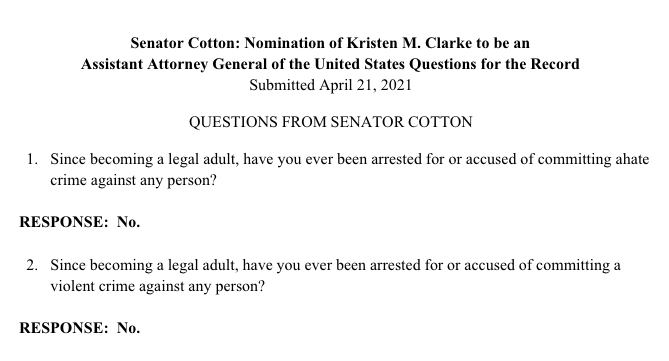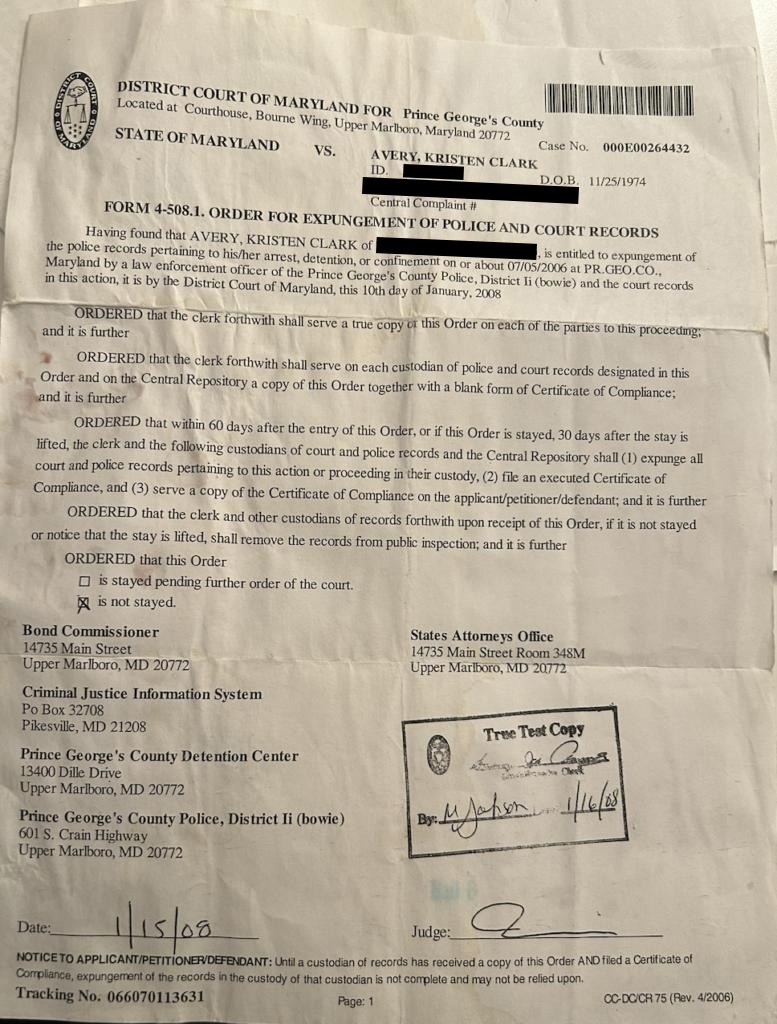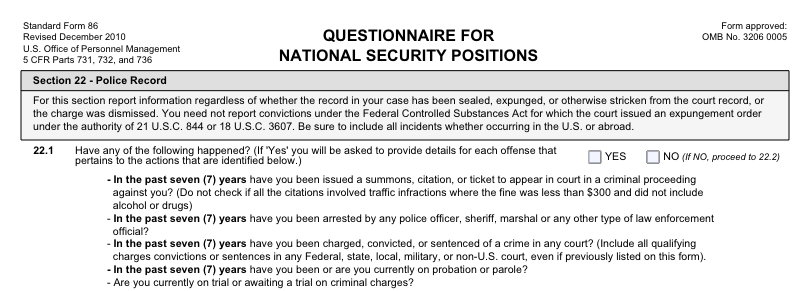FIRST ON THE DAILY SIGNAL: Before becoming one of the Justice Department‘s top leaders, Assistant Attorney General Kristen Clarke was allegedly involved in a violent domestic dispute, according to court documents, records, and text messages—an incident that ended in her arrest and was ultimately expunged. During her Senate confirmation, Clarke specifically denied ever having been arrested for or accused of committing a violent crime.
Clarke was nominated by President-elect Joe Biden on Jan. 7, 2021, and later confirmed by the U.S. Senate on May 25, 2021, to lead the DOJ’s “crown jewel,” as former Attorney General Eric H. Holder Jr. described the Civil Rights Division.
Biden and Vice President Kamala Harris celebrated Clarke as the first black woman to head the Civil Rights Division, promising she would focus on fighting voter suppression and hate crimes “across the country.”
During her confirmation, Sen. Tom Cotton, R-Ark., asked then-nominee Clarke: “Since becoming a legal adult, have you ever been arrested for or accused of committing a violent crime against any person?”
“No,” she responded, according to responses she submitted under oath to “Questions for the Record” from U.S. senators.
Messages as well as records obtained and authenticated by The Daily Signal indicate that Clarke may have been less than forthcoming with this statement.

Clarke’s ex-husband, Reginald Avery, alleged to the American Accountability Foundation’s Tom Jones in 2021 that Clarke attacked him with a knife, deeply slicing his finger to the bone, on the night of July 4, 2006, while they were married and living in Maryland.
According to messages and documents reviewed by The Daily Signal, police arrested Clarke that night. She did not respond to requests for comment for this story.
Court records obtained by The Daily Signal show that a criminal case against Clarke was initiated in the District Court of Maryland for Prince George’s County, but on Oct. 17, 2006, the Maryland state attorney entered a request of “nolle prosequi” in the case, which effectively dismissed the charge without trial.
Approximately a year-and-a-half later, Clarke sought an “Order for Expungement of Police and Court Records” in the same case.

A document obtained by The Daily Signal shows that the district court granted that order in January 2008. The document specifically orders “expungement of police records pertaining to [Clarke’s] arrest, detention, or confinement” on or about July 5, 2006, by a “law enforcement officer of the Prince George’s County Police.”
Citing the “True Test” stamp on the expungement order, an official at the clerk’s office for the District Court of Maryland for Prince George’s County confirmed the authenticity of the expungement order to The Daily Signal.
“That’s a real document,” the official said.
Court records show that Avery and Clarke finalized their contentious divorce in 2009. Clarke had served as a trial attorney for the DOJ’s Civil Rights Division until April 2006, several months before the incident.
When the July 4, 2006, incident occurred, Clarke was leading the left-wing National Association for the Advancement of Colored People (NAACP) Legal Defense Fund’s voting and election efforts.
Expungements: To Disclose or Not to Disclose
It is not immediately clear whether Clarke was legally required to disclose her arrest during her nomination process, though this seems to generally be considered the prudential course of action to take during such a process.
According to Maryland law, Criminal Procedure §10-109, “Disclosure of expunged information about criminal charges in an application, interview, or other means may not be required” by an employer or educational institution of a person who is applying for employment or admission or by a “unit, official, or employee of the State or a political subdivision of the State of a person who applies for a license, permit, registration, or governmental service.”
That Maryland code also says that a person does not need to reveal information about an expunged charge when answering a question concerning a criminal charge that did not result in a conviction.
However, the nonprofit law firm Maryland Legal Aid notes that it is probably prudent to disclose expungement records when applying for certain types of jobs that require a security clearance, such as government or military jobs, since these types of employers are still going to be able to see the criminal charges in a person’s background.
Mark Robbins, who served as general counsel of the U.S. Office of Personnel Management under former Presidents George W. Bush and Donald Trump, believes that a DOJ nominee should indeed disclose an expunged arrest when specifically asked.
Robbins noted that though the expungement processes are typically determined by state law, presidential nominees for Senate confirmation go through a political process. There are two sets of paperwork relevant to a nomination, he said: the first from the White House for clearance before nomination, and the second from the relevant Senate committee.
Both of these sets contain questions about criminal and civil legal actions, Robbins said, as well as an open-ended question to the effect of: “Is there anything else that could even unfairly be seen as a potential hurdle to confirmation?”
“An arrest with an expungement likely has a background and explanation,” he said. “Why not disclose it? It isn’t particularly relevant what the legal consequence of expungement is. The issue is the political consequence of an arrest becoming public during or after the confirmation process, thus embarrassing the administration and Senate.”
Robbins concluded: “In my service as general counsel at two federal agencies, if a nominee asked me whether to disclose an arrest and expungement, I certainly would advise to either disclose in the paperwork with an explanation, or at the very least, note for the record that you would like to discuss this personally with someone in the White House or on the Senate committee staff.”

According to the Center for Presidential Transition, every person hired for a federal job is asked to complete a background check, and nominees are asked to complete either a “Questionnaire for National Security Positions,” the SF-86, or a “Questionnaire for Public Trust Positions,” an SF 85P.
The SF-86, for example, specifically says that applicants must report information “regardless of whether the record in your case has been sealed, expunged, or otherwise stricken from the court record, or the charge was dismissed” (though it notes that applicants don’t need to ‘report convictions under the Federal Controlled Substances Act for which the court issued an expungement order under the authority of 21 U.S.C. 844 or 18 U.S.C. 3607.’”

Every presidential administration has its own version of another form that supplements the SF-86—the SF-86 Supplement, according to the Center for Presidential Transition. That form includes questions about whether “you or your spouse” have been “the subject of any civil or criminal case, administrative proceeding, or government investigation, other than a minor traffic incident.”
It also asks: “With as much detail as possible, please provide any other information, including information about other members of your family, which could suggest a conflict of interest, be a possible source of embarrassment, or be used to coerce or blackmail you.”
Clarke, as a nominee for a DOJ position, would have also been required to fill out a “Questionnaire for non-judicial nominees” from the Senate Judiciary Committee—questionnaires submitted before the hearing.
This would include a confidential section, accessible to the Senate Judiciary Committee staff and members, in which Clarke could have revealed the expunged information.
A source with prior experience in the confirmation process told The Daily Signal that it is unlikely Clarke disclosed the arrest and expungement in the confidential portion. If she had disclosed such an arrest, the source said, members would have likely taken the opportunity to request one-on-one meetings with her to discuss, to hold a closed hearing, or to ask her to discuss the matter publicly.
In 2022, for example, Republicans brought up 6th Circuit nominee Andre Mathis’ three traffic tickets and his “failure to appear in court” related to “extended periods of driving without a license” — information they learned about during his vetting process, as Republican Iowa Sen. Chuck Grassley said at the time.
“Mr Mathis has agreed to discuss this issue publicly and that made possible his appearance today and I thank him for agreeing to do that,” Grassley said, according to a transcript of the hearing, acknowledging that Mathis had agreed to making the tickets public.
“It just speaks to how the process works–when something comes up in the FBI’s background investigation, it’s shared with all the members on the committee and if they want to ask about it either the nominee waives confidentiality or we have a closed portion of the hearing,” a source close to Clarke’s confirmation process explained to The Daily Signal.
A copy of Clarke’s questionnaire obtained by The Daily Signal does not contain any information or questions about possible arrests. The Daily Signal was not able to obtain a copy of the confidential questionnaire.
Multiple sources familiar with the confirmation process told The Daily Signal that they do not believe Clarke disclosed the arrest, not only because they would have been aware of the matter, but also given the nature of Cotton’s written questions, submitted after her confirmation hearing but before the committee voted on her nomination.
“It’s strange beyond strange that Clarke wouldn’t reveal this in the first place,” said appellate litigator Judd Stone, former Texas solicitor general of Texas and former chief of staff to Sen. Ted Cruz, R-Texas. “Just deeply strange … if you reveal it, and it turns out you can’t get through committee, then they tell you quietly that you can’t proceed with the nomination, it doesn’t go out to the press, you don’t get tarred and feathered, and you go back to what you’re doing.”
“I can’t imagine a Republican nomination getting away with this,” he added.
The Fourth of July Incident
Jones, head of the American Accountability Foundation, began digging into Clarke’s background during her Senate confirmation process. He reached out to Avery as part of his investigation, and text messages between Avery and Jones illustrate the alleged events of the July 4, 2006, incident.
“I was seeing another woman,” Avery shared in the May 2021 text message exchange. “She was angry. Attacked me with a knife. I instinctively grabbed it. As I said earlier, I’m not blameless.”
“That’s the story,” Avery insisted. “That’s what happened. She went to jail.”
Avery confirmed to The Daily Signal that his text conversations with Jones accurately represent what took place that night, including that he did not ultimately press charges and that he was not contacted by federal authorities about the incident. He declined to comment further.
Prince George’s County Police Department records show that the department was called on nine different occasions by someone at Avery’s and Clarke’s Upper Marlboro, Maryland, household between May 2003 and December 2007.
Seven of those calls were for a “threat” or some type of domestic violence, but most were cleared without a report. The July 4, 2006, call was made by “Mr. Reginald” (Avery’s first name) and accompanied by a 760 code, according to a mainframe print-out from Prince George’s County computer-aided dispatch system obtained by The Daily Signal.
That 760 code is the department’s clearance code for “arrest,” the Prince George County Police Department confirmed.
That call was not cleared for four hours, and Avery maintains it was Clarke who was arrested. Clarke has not addressed the matter, though given multiple opportunities to respond.
The DOJ official’s ex-husband also shared with Jones that on the night of the incident, he called 911 due to his injury and the “cops came because [his] finger was cut off.” (Avery clarified to The Daily Signal that the finger was sliced to the bone, not cut off.) Police allegedly decided to arrest Clarke, and Avery said he went to the emergency room in Bowie, Maryland, for the injury. He does not have photos of the injury.
Jones and Avery speculated via 2021 text messages about why Clarke would hide the arrest: “I assume she just thinks she won’t get caught,” Jones queried, to which Avery responded, “Yes, the arrogance has always been there. But I don’t understand lying on a federal application.”
Staffers who worked on Senate Judiciary Committee during Clarke’s confirmation say that, while they looked into rumors of an arrest and contacted Avery, they never had access to the expungement order or charge dismissal notice. The Daily Signal is reporting first on the existence of both documents.
Avery refused to speak to the Senate staffers who reached out to him in 2021, a Senate source familiar with Clarke’s confirmation process told The Daily Signal. Staff felt they could not just sling allegations at Clarke without more evidence, the source said, but Cotton’s question to Clarke about violent crime was a direct result of the numerous Republican judiciary committee staff discussions surrounding Clarke, Jones’ findings, and the July 4, 2006 incident.
Jones questioned why Avery’s story was not thoroughly examined during the Senate’s review of Clarke’s record and why Clarke’s ex-husband was never contacted by federal officials during the confirmation process.
Jones also published some of his findings online, in which he noted that “congressional staff” confirmed that Avery had never been contacted by the FBI. The FBI declined to comment on the matter to The Daily Signal.
“Speaking to an ex-spouse is some of the most basic type of investigations that one should do when vetting a senior official,” Jones told The Daily Signal.
The DOJ did not respond to requests for comment for this story.
Clarke Faces More Scrutiny
Clarke did face scrutiny during her nomination process for remarks and social media posts made before her DOJ role, such as calling Alliance Defending Freedom a “hate group” and Liberty University a “fundamentalist Christian school.” She also said that those protesting Dr. Anthony Fauci should be “publicly identified and named, barred from treatment at any public hospital if/when they fall ill and denied coverage under their insurance.”
Clarke similarly criticized Republican politicians from Sen. Lisa Murkowski, R-Alaska, to former President Donald Trump. She supported the allegations of Christine Blasey Ford, submitted testimony to the U.S. Senate that Amy Coney Barrett was unfit to serve as a justice because she would likely rule to overturn Roe v. Wade, critiqued pro-life laws and courts that upheld them, and called a law protecting Down Syndrome babies “draconian.”
Former Fox News host Tucker Carlson, who now heads the Tucker Carlson Network, ran multiple segments highlighting Clarke’s comments about racial superiority as well as her role in organizing a 1994 event while at Harvard University that hosted a professor who accused Jews of persecuting black people. Clarke, who was the president of Harvard’s Black Students Association, has since said it “was a mistake” to host the professor.
At the time of the event, Clarke defended professor Tony Martin when he received backlash, writing, “Professor Martin is an intelligent, well-versed Black intellectual who bases his information on indisputable fact.”
The Daily Signal previously reported that Clarke, who oversees investigations into violations of the Freedom of Access to Clinic Entrances (FACE) Act, has used FACE to charge dozens of pro-life individuals since the overturn of Roe v. Wade. This includes Mark Houck, a Catholic father of seven arrested at gunpoint by the FBI and charged with violating FACE in September 2022 (a jury found Houck was not guilty in January 2023, and the DOJ has not commented on this verdict publicly).
Enacted in 1994, the FACE Act prohibits threats of force, obstruction and property damage intended to interfere with reproductive health care services. It applies not only to abortion clinics, but also to pro-life pregnancy centers and houses of worship.
Though Clarke is the helm of the DOJ’s FACE Act enforcements, she is a vocal abortion proponent who has denounced pro-life pregnancy centers, as the Washington Free Beacon’s Chuck Ross previously reported.
The DOJ has charged only five pro-abortion individuals with violating the FACE Act when they attacked pro-life pregnancy centers, even though hundreds of pregnancy centers and Catholic Churches have been attacked since May 2022, when the Supreme Court’s draft opinion in Dobbs v. Jackson Women’s Health Organization was leaked, indicating Roe v. Wade would soon be overturned.
DOJ’s Civil Rights Division has charged zero individuals with FACE for attacking Catholic Churches, though it has charged other individuals with hate crimes with defacing a synagogue with Neo-Nazi symbols and attempting to burn down a church that planned to host drag show events.












